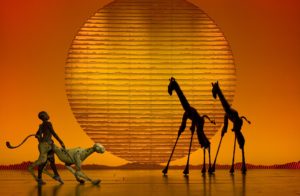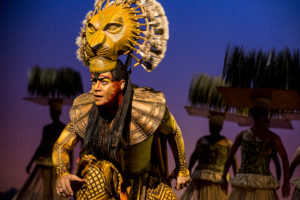
 rating=5]The rich tapestry of the African Serengeti is laid bare before you in Broadway in Chicago’s production of “The Lion King.” “Awesome!” “Amazing!” “Those were the actual words spoken by the audience upon leaving this fabulous show on opening night. This is a performance that will appeal to both adults and children. The masterfully done puppetry is well worth the price of admission. Director, costume designer, and mask and puppet designer Julie Taymor has outdone herself in the creative use of all sorts of intricate gizmos that serve as puppets: each of these mechanical contraptions and their puppeteer recreate authentic movements of African animals. We feel the spirit of Africa: home to lions, hyenas, zebras, giraffes, and elephants. We see the flora and fauna that make up the jungle and savannah. When the “Lion King” first burst onto the Broadway scene in 1997, it was considered revolutionary in that it was one of the first mainstream performances to feature a mostly African-American cast. Today this inspiring story by Roger Allers and Irene Mecchi is enhanced by a new generation of fantastic performers. All that plus the original music by Elton John and Tim Rice, and the brilliant choreography by Garth Fagan make this show a once-in-a-lifetime event.
rating=5]The rich tapestry of the African Serengeti is laid bare before you in Broadway in Chicago’s production of “The Lion King.” “Awesome!” “Amazing!” “Those were the actual words spoken by the audience upon leaving this fabulous show on opening night. This is a performance that will appeal to both adults and children. The masterfully done puppetry is well worth the price of admission. Director, costume designer, and mask and puppet designer Julie Taymor has outdone herself in the creative use of all sorts of intricate gizmos that serve as puppets: each of these mechanical contraptions and their puppeteer recreate authentic movements of African animals. We feel the spirit of Africa: home to lions, hyenas, zebras, giraffes, and elephants. We see the flora and fauna that make up the jungle and savannah. When the “Lion King” first burst onto the Broadway scene in 1997, it was considered revolutionary in that it was one of the first mainstream performances to feature a mostly African-American cast. Today this inspiring story by Roger Allers and Irene Mecchi is enhanced by a new generation of fantastic performers. All that plus the original music by Elton John and Tim Rice, and the brilliant choreography by Garth Fagan make this show a once-in-a-lifetime event.
Where to begin? We begin with the circle of life. We come to understand something about the culture of Africa by means of the character of Rafiki (Gugwana Dlamini), who is an extremely authentic and believable spirit guide. While the character is supposed to be that of a mandrill monkey, Rafiki appears to be more human than not—and a very strong woman at that! She explains that the circle of life doesn’t only mean that bigger creatures eat littler ones and that the death of one creature gives life to another; but on the level of the soul, nothing ever really dies. We live with memories of our loved ones; and, when we’re ready, we incorporate their positive example into our own actions as we work to become the person who we are destined to be. Although it may take many years to discover exactly what our place is in the Universe and where our talents lie and what lessons we need to learn in life, all of this is not on a timetable. Rather, it is the wealth of experiences that we acquire throughout our lifetime that gives us a deeper sense of life’s meaning.
This impactful message is related to us through the biography of a lion named Simba (Jaylen Lyndon Hunter/Darian Sanders) who, in the course of the story, develops the courage to become the king of beasts, in accordance with his destiny. Hunter, who plays Young Simba, is a standout, who holds the show together with a grace and presence well beyond his years. As Simba, he not only has to develop the fortitude necessary to fight evil but also learn how to become a good king, who knows how to rule his subjects wisely and well. His teacher (and positive role model) is his father Mufasa (Gerald Ramsey), the good lion and the good king. His example is a stark contrast to the power hungry, overly ambitious aspirant to the throne Simba’s uncle Scar (Peter Hargrave), who makes for a formidable villain. While Simba thinks he is responsible for his father Mufasa’s death, it is actually Scar’s doing, which Simba only learns when his evil uncle admits as much to him when he is out to kill him. It is when Simba sees the spirit of his deceased father in the water that he realizes that he is his father’s son and must take over the leadership of the pride from his uncle, so as to save the lions from starvation, destruction, and moral turpitude. At the same time, his love for Nala (Farrah Wilson/Khalifa White) grows as he becomes a fully mature adult. Briefly, “The Lion King” is a sophisticated “coming-of-age” story, which lets children know that there is a lot to learn about growing up. At the same time, it lets adults know that death is not final and that life is more interconnected and intertwined than anybody could have possibly imagined.
The actors, singers, and dancers are absolutely wonderful, all of whom have an incredible sense of timing. The highest praise, however, must go to the puppeteers, especially Nick Cordileone, who recreates the meerkat Timon, with his wisecracks and anthropomorphic charm; Nick Lamedica who plays Zazu, the African red-billed hornbill, who serves as the thoughtful royal advisor; and John E Brady who channels the self-effacing Pumbaa, a warthog known for his farts and whose hairstyle is quite superb in this presentation. Each of these actors speaks in the most perfect voice and accent to make the characters which they portray come alive. Special mention should, of course, be made to all of the artists who beautifully mimic the giraffes, zebras, gazelles, hyenas, birds, and other members of the animal kingdom. Perhaps one of my favorite puppets is the giant elephant that comes through the aisle to make its way onto the stage towards the beginning of the performance.
Taymor’s costume design is unrivaled as is hair and makeup by Michael Ward! The attention to detail is exceptional in the creation of the animal costumes and the use of body paint! I especially loved seeing the various types of animal claws! Scenic design by Richard Hudson is often minimal with the significant use of African print curtains but is punctuated by incredible sets, for example, the one with the parallelograms and trapezoids. Absolutely splendid is the gigantic elephant carcass/staircase that moves across the stage. Lighting design by Donald Holder adds to the ambiance of the Africa-themed sets. Especially notable is seeing the use of projection design—an innovation when the show was first produced in 1997—that has become a staple in theatre today and integral to almost every important show. Among other places, we see its use in the ripples of water and in the running of the wildebeests during their yearly migration.
Music director Karl Shymanovitz superbly pulls together Elton John’s music and Tim Rice’s lyrics with the additional music and lyrics by Lebo M and Mark Mancina, Jay Rifkin, Hans Zimmer, and director Taymor. He conducts the pit orchestra in songs that are both hummable and classic. (How many weddings have you gone to where they sing “Can You Feel the Love Tonight”?) In addition, there is lots of African drumming in this show, most notably by two drummers who appear above the audience to both the right and left sides of the stage.
“The Lion King” is what great theatre is all about. With its impeccable puppetry, gorgeous music and dance, and lovely costuming and sets, the show has earned its title as “the world’s #1 musical.” This story makes you really look at life and perhaps remember the sense of wonder that you may have once had as a child. It is a comedy—with its clever one-liners, wordplay, and sometimes toilet humor—and yet it is an equally dramatic tale. If there is any one show for you to see with your family this holiday season, this is the one. Plus, if you’re judicious in spending your dollars, this is the one show to splurge on, so you can sit up close to the stage and see for yourself how all the mechanisms involved with the puppets work—and, of course, you can better see the body makeup and the expressions on all of the actors’ faces. (I should know, because nineteen years ago, the first time I saw “The Lion King” in Chicago, I was that person who sat in the very last row of the theatre.) So run—don’t walk—and buy good seats to see this production, and you will leave with a big smile on your face and a new appreciation for the animals that share the planet with us!

“The Lion King” runs through January 14, 2023, at the Cadillac Palace Theatre, 151 W Randolph, in Chicago.
Tickets start at $33.
Performance schedule:
 Wednesdays – 2:00 p.m. and 7:30 p.m.
Wednesdays – 2:00 p.m. and 7:30 p.m.
Thursdays – 7:30 p.m. No performance on Thanksgiving Day, Thursday, November 24.
Fridays – 7:30 p.m. Extra performance at 2:00 p.m. on Friday, November 25.
Saturdays – 2:00 p.m. and 7:30 p.m.
No 7:30 p.m. performance on Christmas Eve, Saturday, December 24.
Sundays – 1:00 p.m. and 6:00 p.m.
No 6:30 p.m. performance on Sunday, November 27.
No performances on Christmas Day, Sunday, December 25.
No performances on New Year’s Day, Sunday, January 1.
Extra performances:
Tuesday, November 22 – 7:30 p.m.
Monday, November 26 – 7:30 p.m.
Tuesday, December 20 – 7:30 p.m.
Tuesday, December 27 – 7:30 p.m.
Tuesday, January 10 – 7:30 p.m.
For more information and to purchase tickets, go to: https://www.broadwayinchicago.com/show/the-lion-king/.
For general information about Broadway in Chicago and to learn of their other offerings, visit: https://www.broadwayinchicago.com/.
COVID protocols can change at any moment. Masks are currently being recommended but may be required as transmission rates increase. For more information, please see: https://www.broadwayinchicago.com/COVID19/
To see what others are saying, visit www.theatreinchicago.com, go to Review Round-Up and click at “The Lion King”.






More Stories
“Titanique”
“Sunny Afternoon” reviewed by Carol Moore
“No Such Thing”